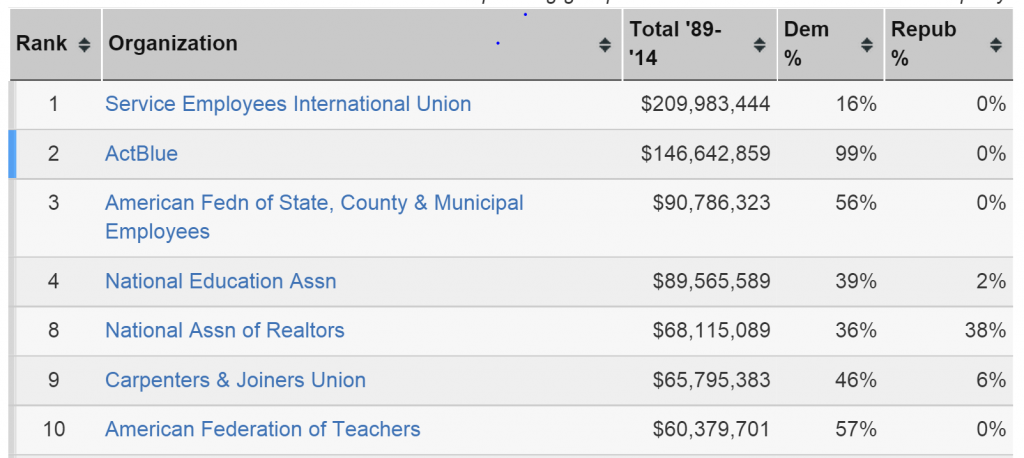
The escalation of nationalized education standards, the push for preschool teachers to have more degrees, and the Obama administration’s overall push for more school before and after K-12 is a way to avoid solving the real problem. When their party’s largest donors are the Service Employees International Union, National Education Association, and the American Federation of Teachers, Democrats have millions of reasons to avoid addressing the challenges of our K-12 education system.

President Obama is right: America does have an education crisis. Where the logic gets fuzzy are his proposals to spend money on preschool or community college instead of substantive reform of K-12.
Take Government Pre-K—Please
Studies by the Obama administration have found marginal impacts, at best, from Head Start early preschool programs: “However, the advantages children gained during their Head Start…yielded only a few statistically significant differences in outcomes at the end of first grade for the sample as a whole.” The most rigorous studies have shown that the marginal differences of government preschool diminish in time, with the end result that preschool has little impact on outcomes. Other reports from the White House find the largest successes came from home-based programs. Oddly, the president never highlights that, as it might support a stay-at-home parent’s choice to defer income while his or her children are young.
Home-based programs appeared to evidence long-term positive impacts for children and families. Compared to the control group, parents reported children who had participated in home-based Early Head Start programs had fewer household moves and at the trend level reported lower rates of ADD/ADHD, depressive symptoms, and family conflict and higher family incomes.
Often what puts preschool choice out of reach for families is cost, while the administration’s demands that states that take its preschool grants require more credentials and higher education of preschool teachers will only increase costs. “Higher-quality” early education will require different thinking, not more of the same failed thinking already being propagated by government in K-12.
Having preschool teachers obtain the same education as K-12 teachers is a lazy conclusion that ignores the unique learning environment needed by children at different ages. It also ignores the mound of research showing that education degrees and certifications do nothing to improve teacher quality. Credentialing demands merely ensures that teachers have the same student-loan burden and a degree that isn’t demonstrating results. If degrees translated into teacher quality, we’d see our k-12 schools improving. Great teachers are interested in children and able to translate that into an engaging learning experience.
Alfie Kohn in the Washington Post noted that
It doesn’t bode well that many supporters of universal pre-K seem to be more concerned about economic imperatives than about what’s good for kids. In his speech last year, for example, the president introduced the topic by emphasizing the need to ‘start at the earliest possible age’ to ‘equip our citizens with the skills and training’ they’ll need in the workplace. The New York Times, meanwhile, editorialized recently about how we must ‘tightly integrate the [pre-K] program with kindergarten through third grade so that 4-year-olds do not lose their momentum. It will have to prepare children well for the rigorous Common Core learning standards that promise to bring their math, science and literacy skills up to international norms.’
We must make sure “four year olds do not lose their momentum”? Assuming that all children are ready to learn the same exact thing at the same age or should prepare for a job, when they are more interested in playing dress-up or building towers of blocks, might be a bit presumptuous. Worse, it may harm our society’s ability to create and invent. How progressive is it to push for education standards that prepare students for a corporate job that may not exist by the time they graduate? Play is a critical part of learning. The phrase “prepare children well for the rigorous Common Core…” pretty much sounds like the opposite of play.
Small Children’s Work Is Play
Why would that matter? According to internationally recognized early childhood researcher Jean Piaget, “Play is the answer to the question: how does anything new come about?” The mindless march to make preschool as joyless as our public education system will only accelerate children checking out of school sooner.
Even the United Nations recognizes play as critical. Check Article 31 of the UN Convention on the Rights of the Child: “State Parties recognize the right of the child to rest and leisure, to engage in play and recreational activities appropriate to the age of the child and to participate freely in cultural life and the arts.” A push to institute more standards and measures on three- and four-year-olds might push the United States out of compliance with this UN-sanctioned right. It’s shocking that President Obama would neglect to address this apparent conflict with the UN.
Reading research on how encourage play amongst preschoolers is now free, thanks to the Internet. No one needs to get a certain four-year degree to be considered worthy of teaching preschoolers. That is not to say we should eliminate all criteria, but why must we resort to the old paradigm that check-the-box exercises will resolve the problem? And why could not multiple approaches to early learning generate their own internal and diverse criteria?
A high-school graduate who happens to have a disposition for patience and the aptitude to read books like “Engaging a Child’s Mind: A Project Centered Approach” could easily serve capably as a preschool teacher. This assumes, of course is that a high school education will provide children the capacity for critical thinking, personal responsibility, and the ability to apply the knowledge they learn. The push for “more education” for teachers is the easiest way to avoid having anyone ask why the current education schedule is no longer sufficient. Teaching young children is vital for our society, but it isn’t a skill that requires a PhD.
Information, and thus the stimuli for innovating it, is at everyone’s fingertips, and it’s not waiting for a government mandate or more costly certifications or degrees. As William Gibson noted, “The future is already here—it’s just not very evenly distributed.” The free market is the best way to experiment with new curriculum approaches that allow for more creativity and more self-directed learning, which is a fancy way of saying more play. The more minds, the merrier. That’s the right approach.
The Obama administration is forcing everyone to take a costly, top-down approach that will stifle early education creativity while increasing its costs. Another billion dollars from the government will unfortunately only limit the potential of our youngest citizens while mandating a solution that has already proven to have limited impact. Education in this country does need fresh thinking, but the proposal from the Obama administration is more politics: More degrees means more students for campaign dono…er, professors, and more potential union members. This administration is artfully avoiding an assessment of why our K-12 schools are failing our children because that would mean having to take a hard look at top Democrat donors. Democrats prefer to pretend that working around the edges of the problem is the solution.
Do Kids Need ‘College’ Because High Schools Aren’t Doing Their Job?
Mandating “free” thirteenth and fourteenth grades via community college should make one wonder what is going wrong in tenth through twelfth grade that makes two more years of de facto public school now necessary. Only increasing opportunity can reduce poverty. More “free” preschool or thirteenth grade only serves as palliative care for those in poverty. These programs don’t spark real change, as demonstrated from studies from Obama’s own administration. It’s a tacit admission from Democrats that their goal is not to eliminate poverty but to paper over it with politically charged policy. In fact, what would animate the Democratic Party if poverty were significantly reduced? They much prefer the self-satisfaction of saying they care without ever having to produce results. If no one were poor, whom would they have to feel superior to?
That’s the problem Democrats won’t be addressing any time soon and it’s the one that deserves this nation’s attention. Institutionalizing children earlier and longer won’t lead to more creativity and innovation, which are the real stimulus of economic growth. Real-world experiences—whether it play when young or entry-level jobs when they’re teens—are being taken off the table while politicians mandate more isolation and testing within the confines of public school. Don’t fall for the bait and switch. It’s time to tackle the real challenge that we are already paying too much for universal education and getting diminishing returns.








